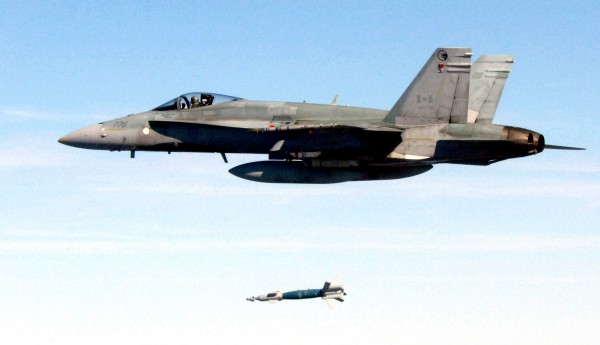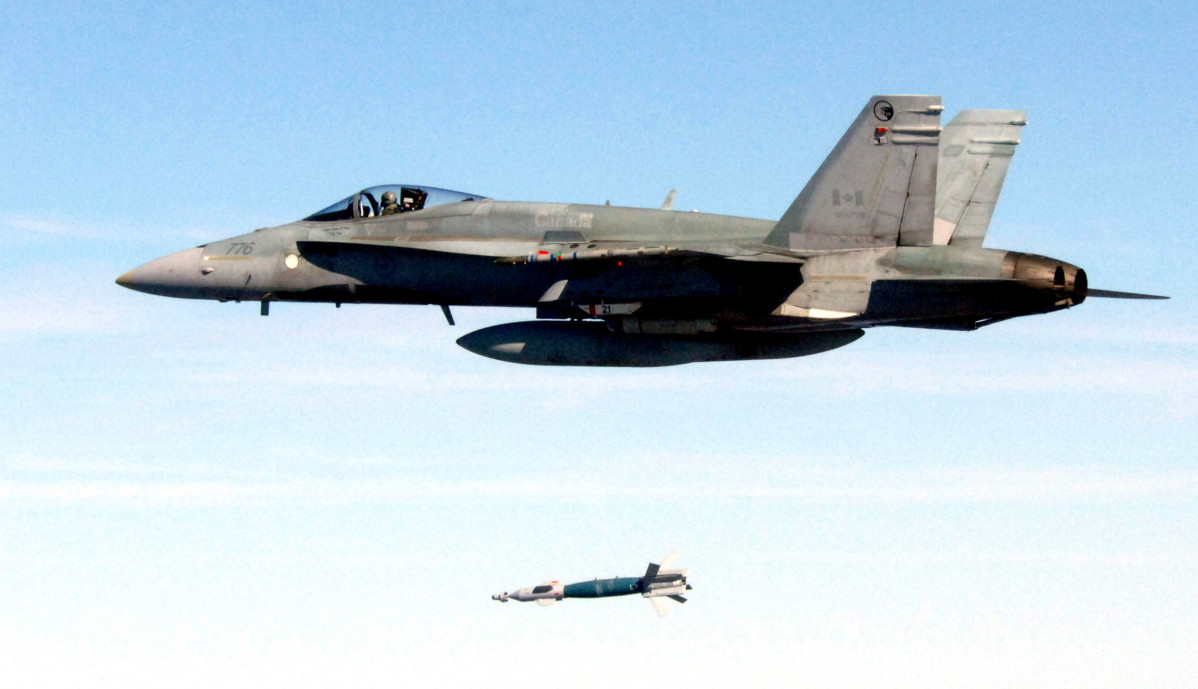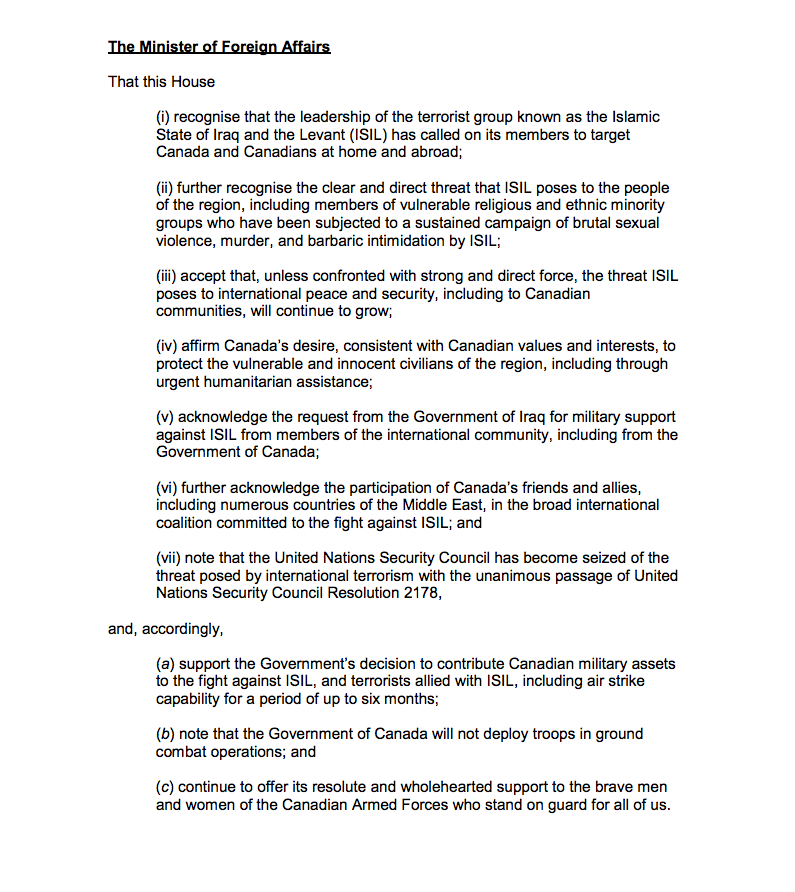
A Canadian F-18 Hornet from the 409th Tactical Fighter Squadron launches a laser-guided bomb during one of the unit’s Weapons Systems Evaluation Program scenarios Dec. 5. (U.S. Air Force photo)
OTTAWA—Prime Minister Stephen Harper’s government is asking Parliament to back a combat mission that will participate in air strikes against the Islamic State (IS), or ISIL, and its allies for up to six months but will not include Canadian troops in ground operations.
Speaking to the House of Commons, Harper said Canadians can’t stand on the sidelines and let others deal with IS if Canada wants to keep its voice in the world.
“The threat that the Islamic State presents is very real, it is serious and it is explicitly directed, in part, against our country,” Harper told a somber but half empty House. “Left unchecked, this terrorist threat can only grow and grow quickly.”
“As a government, we know our ultimate responsibility is to protect Canadians and to defend our citizens from those who would do harm to us and to our families.”
On Monday, the House of Commons is scheduled to debate Harper’s proposal, followed by a vote.
However, as Harper prepares to send Canadian air crews into a war zone, it appears the only party that will be voting in favour of the mission is his own Conservative party.
Tom Mulcair’s opposition NDP, Justin Trudeau’s Liberals and Green Party leader Elizabeth May all announced minutes after Harper unveiled details of the mission that their parties will vote against the government’s motion.
While the initial plan is to conduct air strikes in Iraq, Harper left the door open to the possibility of Canadian airstrikes in Syria.
“We will strike ISIL where – and only where – Canada has the clear support of the government of that country. At present, this is only true in Iraq. If it were to become the case in Syria, then we would participate in air strikes against ISIL in that country also.”
Harper said the goal of the mission will be to “degrade” IS’s ability to engage in “military movements of scale” and to conduct terrorist attacks outside the region. However, he admitted that it will likely not destroy the terrorist army.
“To be clear, we can say that this intervention will not allow us to eliminate the Islamic State, nor to automatically guarantee that another form of governance can take its place in Iraq or in Syria.”
In addition to six CF18′s to participate in air strikes, the government will contribute one air-to-air refuelling aircraft and two Aurora surveillance aircraft along with the necessary air crews and support personnel. It is also extending the non-combat mission of up to 69 members of the Canadian army to advise and help security forces in Iraq.
Up to 669 members of the Canadian armed forces could be involved in the mission – 320 with the CF18′s, 280 with the other aircraft plus up to 69 members of the army.
Harper said his government will also provide humanitarian aide, has strengthened laws to deal with “Canadian foreign fighters” and will soon introduce new measures “to strengthen the ability of our security services to monitor aspiring terrorists.”
While the opposition parties agreed it is important for Canada to help battle IS, they do not believe that a combat mission and air strikes is the best way for Canada to help.Mulcair said Canada should not rush into war – a war against a group the United States has been fighting in one form or another for a decade.
“The prime minister insists that this mission in Iraq will not be allowed to become a quagmire but is that not precisely what our American allies have been facing in Iraq for the last 10 years,” Mulcair told the House. “Will Canada be stuck a decade from now mired in a war we wisely avoided entering a decade ago?”
While Mulcair left the door open in his speech, NDP sources said later that the NDP will vote against the Conservative government’s motion and may also seek to amend it.
Trudeau said Harper has failed to make the case for the mission.
“Unlike the Prime Minister, Liberals believe that Canada can make a more helpful contribution to the international effort to combat ISIL than a few aging war planes. Canadians have a lot more to offer than that. We can be resourceful and there are significant, substantial non-combat roles that Canada can play.”
May said she supports Harper’s intentions but Canada has to be careful not to make the situation worse as has so often happened in the past.
“Bombings have never ended an Islamic or any religious extremist terrorist threat. Time after time, it has made matters worse. Let us try to look to the lessons of history before we go to war again.”
May also questioned why Harper is planning to send forces to Iraq but hasn’t tried to prevent atrocities happening in Darfur or Congo.
Harper’s announcement comes as an Ipsos public opinion poll conducted for Global News earlier this week found that a majority of Canadians, 64 per cent, support the use of Canadian air strikes in the battle against IS in Iraq while 36 per cent oppose the mission.
However, the poll also found significant differences in support across the country. While 71 per cent of Ontario residents supported Canada participating in air strikes, support dropped to 53 per cent in Quebec. The poll found that 69 per cent of Albertans polled supported the proposed mission, followed by 64 per cent in British Columbia, 56 per cent in Saskatchewan and Manitoba and 55 per cent in Atlantic Canada.
During Question Period Friday, opposition MPs like Liberal Joyce Murray railed against the proposed limit of five hours for Monday’s debate, saying it is not enough time to debate something this important.
The Liberal Party’s rejection of the proposed mission comes only 24 hours after Trudeau said he had not yet made up his mind and a month after the Liberals supported Harper’s proposal for a 30 day non-combat mission.
“There is a very clear line between a non-combat role and combat role and if Mr. Harper wants to step across that line – a line that is very difficult to step back from – the onus is on him to make that case,” Trudeau told reporters as one of his advisers, former general Andrew Leslie, looked on.
“What we have seen is that he is uninterested in making that case either to opposition parties or to Canadians.”
NDP Foreign Affairs Critic Paul Dewar said the most troubling aspect of the mission unveiled Friday is the possibility of Canadian air strikes on Syria.
“What was most shocking and troubling is that he’s opened the door to actually going into Syria,” Dewar told reporters. “This is shocking for two reasons. One is that for those who – and we thought the prime minister was not wanting to aid and abet in any way al-Assad – it opens the door for that. And that’s something that we can’t support at all.”
The United Kingdom’s motion spells out there would be no air strikes in Syria without returning to Parliament for a vote, Dewar pointed out.
Conservative MP Laurie Hawn, a former fighter pilot, said the key question – and one he said the Canadian forces have been studying – is what kind of surface to air missiles ISIS may have.
Hawn said air strikes aren’t without risk but they are less risky than Canadian forces being involved in a ground campaign.
“The airplanes are very capable. The defensive systems in the airplane are very capable. The pilots are very capable…Nothing is riskless. I mean, going to war, you know, entails risk. There’s far less risk to Canadian personnel writ large in an air war than there would be if we had Canadian boots on the ground for combat for sure.”
Hawn said it is also easier for Canada to extricate itself from an air campaign.
“In an air operation, you can stop it right now. You can not take off. You can take off and go the other way.”



